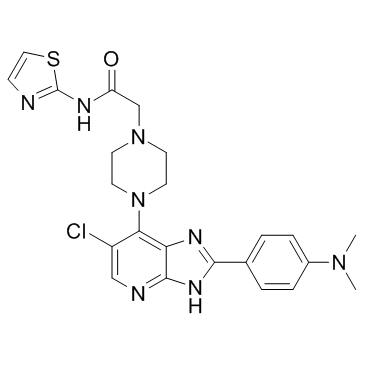
CCT129202
CAS No. 942947-93-5
CCT129202( CCT-129202 | CCT 129202 )
Catalog No. M16750 CAS No. 942947-93-5
CCT129202 is a potent, selective, ATP-competitive pan-Aurora kinase inhibitor with IC50 of 42, 198 and 227 nM for Aurora A, Aurora B and Aurora C, respectively.
Purity : >98% (HPLC)
 COA
COA
 Datasheet
Datasheet
 HNMR
HNMR
 HPLC
HPLC
 MSDS
MSDS
 Handing Instructions
Handing Instructions
| Size | Price / USD | Stock | Quantity |
| 2MG | 49 | Get Quote |


|
| 5MG | 73 | Get Quote |


|
| 10MG | 135 | Get Quote |


|
| 25MG | 239 | Get Quote |


|
| 50MG | 383 | Get Quote |


|
| 100MG | 565 | Get Quote |


|
| 500MG | 1215 | Get Quote |


|
| 1G | Get Quote | Get Quote |


|
Biological Information
-
Product NameCCT129202
-
NoteResearch use only, not for human use.
-
Brief DescriptionCCT129202 is a potent, selective, ATP-competitive pan-Aurora kinase inhibitor with IC50 of 42, 198 and 227 nM for Aurora A, Aurora B and Aurora C, respectively.
-
DescriptionCCT129202 is a potent, selective, ATP-competitive pan-Aurora kinase inhibitor with IC50 of 42, 198 and 227 nM for Aurora A, Aurora B and Aurora C, respectively; displays high selectivity for the Aurora kinases over a broad range of 13 other kinases; inhibits proliferation in multiple cultured human tumor cell lines (GI50=0.08-1.7 uM), induces aberrant mitosis that leads to apoptosis; reduces phosphorylation of histone H3, stabilizes p53, and inhibits growth of HCT116 human colon cancer xenografts in athymic mice.
-
In VitroCCT129202 causes the accumulation of human tumor cells with z4N DNA content, leading to apoptosis. CCT129202 is found to induce apoptosis with GI50 values that ranges between 0.08 and 1.7 μM. CCT120202-treated human tumor cells shows a delay in mitosis, abrogation of nocodazole-induced mitotic arrest, and spindle defects. CCT129202 Causes p21Up-regulation, Rb Hypophosphorylation, and H2F-Dependent TK1 Down-regulation.
-
In VivoGrowth of HCT116 xenografts in nude mice is inhibited after i.p. administration of CCT129202. p21, the cyclin-dependent kinase inhibitor, is induced by CCT129202. Up-regulation of p21 by CCT129202 in HCT116 cells led to Rb hypophosphorylation and E2F inhibition, contributing to a decrease in thymidine kinase 1 transcription.
-
SynonymsCCT-129202 | CCT 129202
-
PathwayCell Cycle/DNA Damage
-
TargetAurora Kinase
-
RecptorAurora A , Aurora B , Aurora C
-
Research AreaCancer
-
Indication——
Chemical Information
-
CAS Number942947-93-5
-
Formula Weight497.0156
-
Molecular FormulaC23H25ClN8OS
-
Purity>98% (HPLC)
-
Solubility10 mM in DMSO
-
SMILESO=C(NC1=NC=CS1)CN2CCN(C3=C4C(NC(C5=CC=C(N(C)C)C=C5)=N4)=NC=C3Cl)CC2
-
Chemical Name1-Piperazineacetamide, 4-[6-chloro-2-[4-(dimethylamino)phenyl]-3H-imidazo[4,5-b]pyridin-7-yl]-N-2-thiazolyl-
Shipping & Storage Information
-
Storage(-20℃)
-
ShippingWith Ice Pack
-
Stability≥ 2 years
Reference
1. Chan F, et al. Mol Cancer Ther. 2007 Dec;6(12 Pt 1):3147-57.
2. Cheng C, et al. Mol Pharm. 2012 Jul 2;9(7):1971-82.
3. Tobío A, et al. Antiinflamm Antiallergy Agents Med Chem.
molnova catalog



related products
-
Phthalazinone pyrazo...
Phthalazinone pyrazole is potent, selective, and orally bioavailable inhibitor of Aurora-A kinase. Aurora-A is overexpressed in a variety of tumor types and displays oncogenic activity.
-
ENMD-2076 tartrate
A multitargeted kinase inhibitor with IC50s of 3/14/23/40 nM for Flt3/Aurora A/Src/VEGFR2.
-
Gibberellic acid
Gibberellic acid (also called Gibberellin A3, GA, and GA3) is a hormone found in plants and fungi.



 Cart
Cart
 sales@molnova.com
sales@molnova.com


